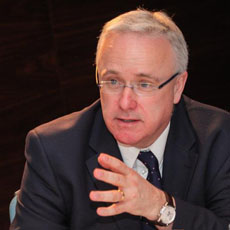Long before Theresa May reached Number 10, many had noticed her affinity for religious communities. Throughout the Coalition years she was an assiduous visitor of the parishes in her own constituency, perhaps inspired by her devout Anglo-Catholic father who – according to Giles Fraser – named her after St Teresa of Avila. Later, as a guest at Archbishop’s House in Victoria, she built good links beyond Lambeth Palace. In 2014 she played a leading part, with Pope Francis and Cardinal Nichols, in launching a global alliance of police chiefs to combat trafficking which holds its latest meeting in Rome this week.
This year, too, May has taken steps which should encourage Catholics and those of Britain’s other faith communities. She was the first Secretary of State of any party to pledge significant resources to the Community Security Trust, which provides protection to British synagogues. Since becoming Prime Minister, May has hosted Cardinal Nichols at Number 10, which is more than David Cameron could find time for. But perhaps the most encouraging sign of all is the appointments May has made to her staff.

First, her co-chiefs of staff. One, Fiona Hill, is the driving force behind May’s anti- human trafficking work and especially the trailblazing Modern Slavery Act she delivered into law as Home Secretary. By all accounts able and fiercely loyal to her boss, Hill is reportedly a Catholic. The other, Nick Timothy, is from a working-class area of Birmingham where the Redemptorists loom large; he is also the first mainstream political adviser I have ever heard demonstrate any understanding of canon law. It is his genius which unjammed the admissions “cap” imposed not by statute but by bureaucratic regulation, and which had constrained Dioceses and Religious Orders from extending their educational provision.
Second, and perhaps most strikingly, the PM has appointed one Jonathan Hellewell as her Special Adviser (SPAD) on faith at Number 10. Prime Ministers have sometimes had private secretaries with a religious specialism – like Francis Campbell, now at St Mary’s University, or Gila Sacks, a leading light in the Jewish Limmud Festival. But Hellewell is the first SPAD with a faith brief to work directly for a PM.
Hellewell brings huge personal gifts to the role. Intensely religiously literate, he is politically astute, organisationally effective, discreet and senior. Previously private secretary to three leaders of the Conservative party – one Catholic, one Anglican, one Jewish – he subsequently worked for St James’s Palace taking a lead for Prince Charles’ team on his huge charitable portfolio, as well as faith engagement. Hellewell arrives in Downing Street after a spell working for the Archbishop of Canterbury and with a wide acquaintance in churches and other communities old and new.
His appointment answers a long-standing demand from parts of the Conservative party – especially from the influential website Conservative Home – for religious communities to be structurally integrated into Number 10’s work. Given the diversity of faith communities’ contributions to civil society – in education, charitable work, and innumerable other areas – this makes good political sense.
May’s appointments suggest a potential that has thus far eluded many in policy and politics: namely, a more considered attempt to unlock the potential of people of faith for public service, in defence of the weak, and to mitigate abuses on the grounds of religion and belief.
We should not expect May’s government to deliver grand new faith-based policy initiatives or responses to the normative statements so popular with bishops and other religious leaders. Instead, expect something more concrete. The conditions are now ripe to address the obstacles facing faith organisations – red tape, lack of translation between public policy and religious civic practice, and restriction of funds to faith organisations where there should be a level playing field.
The Prime Minister has the reputation of preferring to “do something” rather than be seen to “be someone”. That will help her to encourage the huge potential of religious communities to make a difference. As Team May goes to work, the churches ought to give thanks.

Davis, Francis. (2016, October 31). Expect some religion-friendly reforms from Theresa May and her gifted advisers [Blog post]. Retrieved from http://www.catholicherald.co.uk/commentandblogs/2016/10/31/expect-some-religion-friendly-reforms-from-theresa-may-and-her-gifted-advisors/
